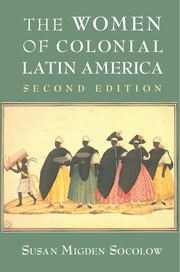Book contents
- Frontmatter
- Dedication
- Contents
- List of Figures
- Acknowledgments
- Introduction: Why Women?
- Chapter One Iberian Women in the Old World and the New
- Chapter Two Before Columbus: Women in Indigenous America and Africa
- Chapter Three Conquest and Colonization
- Chapter Four The Arrival of Iberian Women
- Chapter Five Women, Marriage, and Family
- Chapter Six Elite Women
- Chapter Seven The Brides of Christ and Other Religious Women
- Chapter Eight Women and Work
- Chapter Nine Women and Slavery
- Chapter Ten Women and Social Deviance
- Chapter Eleven Women and Enlightenment Reform
- Conclusion
- Documents
- Suggested Further Reading
- Index
- Plate section
- References
Chapter Ten - Women and Social Deviance
Crime, Witchcraft, and Rebellion
Published online by Cambridge University Press: 05 February 2015
- Frontmatter
- Dedication
- Contents
- List of Figures
- Acknowledgments
- Introduction: Why Women?
- Chapter One Iberian Women in the Old World and the New
- Chapter Two Before Columbus: Women in Indigenous America and Africa
- Chapter Three Conquest and Colonization
- Chapter Four The Arrival of Iberian Women
- Chapter Five Women, Marriage, and Family
- Chapter Six Elite Women
- Chapter Seven The Brides of Christ and Other Religious Women
- Chapter Eight Women and Work
- Chapter Nine Women and Slavery
- Chapter Ten Women and Social Deviance
- Chapter Eleven Women and Enlightenment Reform
- Conclusion
- Documents
- Suggested Further Reading
- Index
- Plate section
- References
Summary
Being a close friend of Lusiana and my husband just having given me a slap in the face, I ran into Lusiana in the bathing room where she asked me if I wanted a remedy to take away my husband’s drinking vice. I said I did and the next day she called me over to her house and told me to give my husband cemetery dirt to drink, that with this you tamed men, that in this way she had hers very well tamed.
A society’s definition of normal female behavior is often best viewed by examining those individuals considered to be socially and culturally atypical or “deviant.” The study of the socially different also illuminates power relationships and the relative control that one group in society held over other groups. In colonial Latin America, “deviance” as reflected in criminal records, Inquisition trials, and personal papers ranges from the story of crime and punishment to cases of sorcery, riots and political uprisings, and examples of personal rebellion.
Women appear frequently in the criminal records of the courts of colonial Latin America, although given their numbers in these societies, they were less likely to appear in court than men were. With few exceptions, women were involved in interpersonal rather than economic or political crimes. Women’s lesser involvement in all but domestic crime reflects the fact that women led more sheltered lives, did not hold political or religious offices, and did not have primary responsibility for contact with outsiders.
- Type
- Chapter
- Information
- The Women of Colonial Latin America , pp. 157 - 176Publisher: Cambridge University PressPrint publication year: 2015



